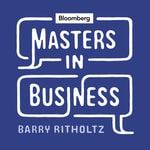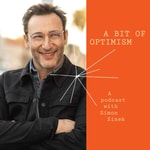Odd Lots – Details, episodes & analysis
Podcast details
Technical and general information from the podcast's RSS feed.

Odd Lots
Bloomberg
Frequency: 1 episode/3d. Total Eps: 1027

Bloomberg's Joe Weisenthal and Tracy Alloway explore the most interesting topics in finance, markets and economics. Join the conversation every Monday and Thursday.
Recent rankings
Latest chart positions across Apple Podcasts and Spotify rankings.
Apple Podcasts
🇨🇦 Canada - investing
27/07/2025#8🇨🇦 Canada - business
27/07/2025#21🇬🇧 Great Britain - investing
27/07/2025#11🇬🇧 Great Britain - business
27/07/2025#37🇩🇪 Germany - investing
27/07/2025#32🇩🇪 Germany - business
27/07/2025#83🇺🇸 USA - investing
27/07/2025#14🇺🇸 USA - business
27/07/2025#66🇫🇷 France - investing
27/07/2025#52🇨🇦 Canada - investing
26/07/2025#9
Spotify
🇬🇧 Great Britain - business
27/07/2025#30→🇺🇸 USA - business
27/07/2025#25↘🇬🇧 Great Britain - business
26/07/2025#30→🇺🇸 USA - business
26/07/2025#24→🇬🇧 Great Britain - business
25/07/2025#30↘🇺🇸 USA - business
25/07/2025#24→🇬🇧 Great Britain - business
24/07/2025#28→🇺🇸 USA - business
24/07/2025#24↘🇬🇧 Great Britain - business
23/07/2025#28↘🇺🇸 USA - business
23/07/2025#22→
Shared links between episodes and podcasts
Links found in episode descriptions and other podcasts that share them.
See allRSS feed quality and score
Technical evaluation of the podcast's RSS feed quality and structure.
See allScore global : 59%
Publication history
Monthly episode publishing history over the past years.
Adam Posen on the Dangers of Jerome Powell's 'Rifle Shot' Jackson Hole Speech
vendredi 30 août 2024 • Duration 34:21
Last week at Jackson Hole, Federal Reserve Chair Jerome Powell delivered a short and powerful speech indicating that it's time for a policy pivot. The goal now, from his perspective, is to prevent further deterioration of the US labor market. His speech didn't delve much into theory or nuance. In this episode, we speak with Peterson Institute President, Adam Posen, who found the speech unsatisfying. He argues that the state of the labor market, while cooling, didn't merit a "rifle shot" approach, such as the one Powell delivered. He explains his concerns and how he sees the risks materializing from here.
See omnystudio.com/listener for privacy information.
Hyun Song Shin on How Big the Yen Carry Trade Really Is
jeudi 29 août 2024 • Duration 38:25
Remember August 5th? That was the day that markets around the world plunged in historic fashion and everyone became an overnight expert on the yen carry trade. But what really is the yen carry trade? How big is it? Who is making the trade? And what is its connection to markets all around the world? On this episode, recorded at the Kansas City Federal Reserve Bank of Kansas City's Economic Symposium in Jackson Hole, Wyoming, we speak with Hyun Song Shin, economic advisor and head of research at the Bank for International Settlements. He walks us through the mechanics of the trade, what went on in early August, and the lessons we've already learned from it.
Only Bloomberg.com subscribers can get the Odd Lots newsletter in their inbox each week, plus unlimited access to the site and app. Subscribe at bloomberg.com/subscriptions/oddlots
See omnystudio.com/listener for privacy information.
How the US Treasury Will Fund the Next $20 Trillion in Debt
lundi 12 août 2024 • Duration 45:30
When it comes to financing the US government's borrowing needs, the Treasury Department has some discretion in how it's done. It can sell 30-year Treasuries. It can sell 10-year Treasuries. It can sell a lot of three-month T-bills. Every quarter, it's always going to be some kind of mix. And in theory, the decisions about where on the curve it issues debt can have effects on the market and the economy, since different instruments have different liquidity and risk profiles. Recently, the Treasury has come under criticism for issuing a lot of short-dated debt. Some economists have dubbed it "Activist Treasury Issuance," with the allegation that Janet Yellen & Co. are purposely trying to counteract the impact of the Federal Reserve's quantitative tightening by issuing less debt at the long end of the curve. So is there anything to these criticisms? And how exactly does the Treasury go about making these decisions anyway? On this episode, we speak to a dissenting voice who argues that the Treasury has approached the task using the same methods it has always employed. Amar Reganti is a fixed-income strategist at Wellington Management and Hartford Funds, who earlier in his career spent four years at Treasury in the Office of Debt Management. He walks us through the Treasury's general issuance approach, why the funding mix changes over time, why it's been issuing more at the short end in recent quarters, and the overall strategy the government will use to fund what the Congressional Budget Office estimates will be another $20 trillion worth of borrowing over the next decade.
Read More at Bloomberg.com:
Mnuchin Says It's Time to Kill the Treasury Bond He Created
The Trillion Dollar Legal Memo: FOIA Files
Only Bloomberg.com subscribers can get the Odd Lots newsletter in their inbox each week, plus unlimited access to the site and app. Subscribe at bloomberg.com/subscriptions/oddlots
See omnystudio.com/listener for privacy information.
How a Second Trump Administration Could Upend US-China Relations
lundi 12 février 2024 • Duration 39:48
Back in 2016, Donald Trump campaigned on a platform that included a much harsher stance toward trade with China, and the US-China Trade War was a big deal while he was in office. But the Biden administration has quietly continued the Trump tariff regime and even enacted more stringent restrictions targeting China's use of technology, including on semiconductors. Now that Trump looks set to get the Republican presidential nomination again, he's suggesting even higher tariffs — of 60% or more — on Chinese goods. What effect would that actually have on the US economy and global trade? Would it lead to higher prices for Americans when the country is still struggling with inflation? Or would it result in a slowing of the economy that actually mutes prices? Would US domestic manufacturing ramp up to fill the gap? Or would we simply import more from other countries? In this episode, we speak with Tom Orlik, chief economist at Bloomberg Economics, and Mackenzie Hawkins, US industrial policy reporter for Bloomberg News, who have published an in-depth analysis of the impact of these potential tariffs.
See omnystudio.com/listener for privacy information.
How Surging US Oil Output Is Being Moved and Stored
vendredi 9 février 2024 • Duration 41:34
US oil production has surged to an all-time record of more than 13 million barrels produced per day. But where's all that crude actually going? And how is it being handled and stored? On this episode, we speak with Steven Barsamian, chief operating officer at the Tank Tiger, a clearing house for terminal storage, and co-host of the Tank Talk podcast, about the business of moving and storing oil and its related products. We talk about what storage capacity looks like right now, how it's changed over time, plus last year's diesel shortage in the Northeast. He also describes exactly how crude oil and refined products move from point A to point B, talks about the crud you find at the bottom of storage tanks, and explains why you should definitely not keep oil in the bathtub (or on your desk) to benefit from contango.
See omnystudio.com/listener for privacy information.
NY Community Bancorp's Problems in the Rent-Stabilized Market
jeudi 8 février 2024 • Duration 37:29
The last week saw a major plunge in shares of New York Community Bancorp after the company revealed challenges in its lending to multi-family residential developers. So what went wrong at this bank? And what does it say about this particular market? On this episode we speak with Quantierra CEO Ben Carlos Thypin, a New York City landlord and investor, about the bank's large role within NYC's rent-stabilized housing market. Over the last year, Ben has advised funds to short NYCB based on its exposure to this complex corner of real estate. He explains how NYCB's position, combined with market and regulatory changes to the city's housing market, contributed to the strains.
See omnystudio.com/listener for privacy information.
How Businesses Decide Exactly Where to Set Up Shop
lundi 5 février 2024 • Duration 53:20
We know that companies think carefully about where they open stores. They might look at things like how many people pass by the location on a day-to-day basis or how easy it is to access the site by car. But what are the lesser known factors that go into deciding where to open a brick-and-mortar store? And how have these considerations changed over time? In this episode, we talk about the art of retail site selection. We speak with Tom McGee, CEO of the International Council of Shopping Centers, which annually hosts one of the biggest deal-making events connecting retailers and commercial real estate owners. Then, we drill down into a specific type of business: drive-thrus for coffee chains and fast food restaurants. We speak with Chris Hatch, partner at Forza Development.
See omnystudio.com/listener for privacy information.
Lots More on Why Farmers Across Europe Are Furious
vendredi 2 février 2024 • Duration 22:38
In France, the Netherlands, Germany, and Poland, we've seen a wave of protests recently from angry farmers. So what's driving the activity? On this episode of Lots More, we speak with Lorcan Roche Kelly, a former cattle farmer in Western Ireland who is now the business editor at the Irish Farmers Journal. He explains how a combination of factors from climate obligations, economic conditions, government regulation, and free trade deals have put the squeeze on many farms, causing this public revolt. He explains the unique conditions facing each country, as well as broader political and economic ramifications.
See omnystudio.com/listener for privacy information.
How Global Shippers Are Dealing With a Worsening Red Sea Crisis
jeudi 1 février 2024 • Duration 48:35
Attacks on ships in the Red Sea continue to escalate. What started with narrow strikes by Yemeni-based Houthi militants against Israel-linked vessels has now expanded to ships carrying a wide range of freight, including oil and liquified natural gas. The US military has responded with strikes against Houthi targets, but so far they don't appear to have much of a deterring effect. Meanwhile shipping delays and costs — driven in part by anxious insurers — continue to worsen. To understand the challenge to global trade and how bad it could get, we speak with maritime historian Sal Mercogliano, a professor at Campbell University and the host of the What Is Going On With Shipping? show on YouTube. He discusses how shipping companies are making operational decisions in the area, how boat crews are coping, and how various international militaries are responding. He also talks about the broad history of the US Navy and its traditional role in securing international trading routes.
See omnystudio.com/listener for privacy information.
Mark Cabana on the Fed, QT and Treasury Funding
mercredi 31 janvier 2024 • Duration 42:13
It's a busy week for the bond market with a meeting of the Federal Reserve and the release of the US Treasury's quarterly refunding statement. While a lot of people have been focusing on when the Fed will cut benchmark interest rates, there's also an ongoing debate about how fast the central bank will shrink its balance sheet given last year's banking crisis and the recent drama in the repo market. In this episode, we speak with Mark Cabana, longtime rates strategist at Bank of America, about the big questions lurking behind the week's events. We talk about who will buy all the bonds the US is selling, what will happen to bank balance sheets as rates go down, and the impact of liquidity on the broader market.
See omnystudio.com/listener for privacy information.









